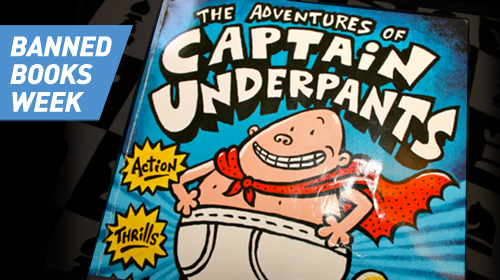
"Captain Underpants and the Perilous Plot of Professor Poopypants." "Captain Underpants and the Wrath of the Wicked Wedgie Woman." "Captain Underpants and the Farty Fight for Free Speech." Okay fine, I made up the last one.
The silly titles of the "Captain Underpants" series lined our bookshelf at home, thanks to my younger brother. As his wiser and worldlier older sister, I wanted nothing to do with such absurdity. It seems some older people, however, have taken greater offense to Dav Pilkey's children's books, their paranoia almost more farcical than the titles themselves.
For the past two years, "Captain Underpants" was the book most frequently sought to be censored or banned, according to the American Library Association (ALA). Complaints have included "offensive language, unsuited for age group, [and] violence." Aside from potty jokes, the books contain no inappropriate language. The extent of violence includes a ping-pong serve-o-matic that shoots out eggs instead of balls, landing on everybody's head.
Horrific, really.
The ALA's Office for Intellectual Freedom reported 307 challenges to books in 2013, though it estimates that 70 to 80 percent of challenges are never reported. Other books on the top 10 most challenged list for the past year include popular reads like Toni Morrison's "The Bluest Eye" and Suzanne Collins' "The Hunger Games."
INFOGRAPHIC: Which of your favorite books have been banned?
Banned Books Week is an effort the national book community has organized since 1982 to draw attention to the problem of censorship in schools, bookstores, and libraries. The week celebrates so-deemed "harmful" books, which paternalistic forces have tried, sometimes successfully, to take off the shelves. More importantly, it raises awareness about how dangerous it is for our country to ban books in the first place.
Despite the protections of the First Amendment, our right to think, record, and spread our ideas has been consistently challenged since our country's founding.
Print and visual media have been censored many times to the detriment of our democracy – too often because the powerful feared that their comfortable status quo was under threat. Beginning in the 1830s until the end of the Civil War, for example, the U.S. postmaster general refused to carry abolitionist pamphlets to the South. During the Red Scare, filmmakers were jailed for alleged ties to communism. In the 1980s, the Reagan administration actually passed a law to end the production of Braille copies of Playboy — because heaven forbid the visually impaired be corrupted through their fingers.
Today, teachers and librarians remain under a barrage of paranoid adults attempting to remove material from school curricula and bookshelves. Other censorship advocates have turned to the Internet as their new frontier. And in an age of surveillance, many writers are increasingly engaging in self-censorship to protect themselves from a snooping government.
Since its inception in 1920, the ACLU has been at the forefront of the fight against censorship, winning many important victories for free speech along the way. Today we are defending reporters' right to observe and write about executions, fighting for students to exercise their First Amendment rights, and advising a government whistleblower who has spurred an unprecedented debate on the need for government reform.
Banned Books Week celebrates these and other efforts to defend our right to think and learn about whatever we want, no matter how unorthodox or unpopular. Whether about an underpants hero, a troubled youth, or a civil rights leader, information and our unfettered access to it is critical for free thought and the health of our democracy.
Find your local Banned Books Week event here, and keep on fighting the farty fight.
Learn more about banned books and other civil liberty issues: Sign up for breaking news alerts, follow us on Twitter, and like us on Facebook.



